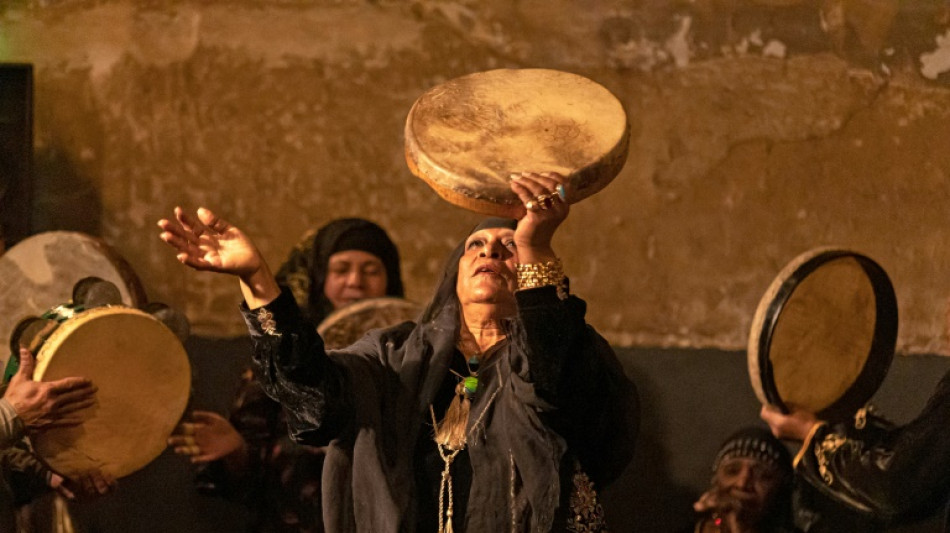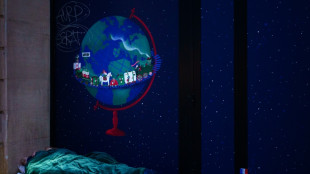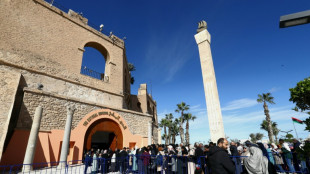
-
 Trump-hosted Kennedy Center awards gala ratings plummet
Trump-hosted Kennedy Center awards gala ratings plummet
-
Israel begins demolishing 25 buildings in West Bank camp

-
 Cambodian soldiers freed by Thailand receive hero's welcome
Cambodian soldiers freed by Thailand receive hero's welcome
-
Sudan lose to Burkina Faso as Algeria win again at Cup of Nations

-
 Man City's Rodri and Doku could return against Sunderland
Man City's Rodri and Doku could return against Sunderland
-
French minister criticises Clooney's 'double standard' passport

-
 Ukrainians wish for peace in 2026 -- and no more power cuts
Ukrainians wish for peace in 2026 -- and no more power cuts
-
Glasner coy over Palace pursuit of Spurs striker Johnson

-
 Neville labels Man Utd's draw with Wolves 'baddest of the bad'
Neville labels Man Utd's draw with Wolves 'baddest of the bad'
-
Stocks pull lower at end of record year for markets

-
 France plans social media ban for children under 15
France plans social media ban for children under 15
-
Mbappe suffers knee sprain in blow for Real Madrid

-
 Putin wishes Russians victory in Ukraine in New Year speech
Putin wishes Russians victory in Ukraine in New Year speech
-
Iran government building attacked as top prosecutor responds to protests

-
 World begins to welcome 2026 after a year of Trump, truces and turmoil
World begins to welcome 2026 after a year of Trump, truces and turmoil
-
Fofana reckons 'small details' restricting Chelsea's progress

-
 Israel to ban 37 aid groups operating in Gaza
Israel to ban 37 aid groups operating in Gaza
-
Filmmaker Panahi says Iran protests 'to move history forward'

-
 Xi says China to hit 2025 growth target of 'around 5 percent'
Xi says China to hit 2025 growth target of 'around 5 percent'
-
Turkey steps up anti-IS raids, arresting 125 suspects

-
 Arteta says Arsenal reaping rewards for 'sacrifices and commitment'
Arteta says Arsenal reaping rewards for 'sacrifices and commitment'
-
China says live-fire drills around Taiwan 'completed successfully'

-
 Nancy adamant he's still the man for Celtic job after Motherwell defeat
Nancy adamant he's still the man for Celtic job after Motherwell defeat
-
Hoping for better year ahead, Gazans bid farewell to 'nightmare' of 2025

-
 Queen Camilla recalls fighting back against train attacker
Queen Camilla recalls fighting back against train attacker
-
Stocks drop at end of record year for markets

-
 Amorim still 'really confident' about Man Utd potential despite Wolves draw
Amorim still 'really confident' about Man Utd potential despite Wolves draw
-
Berlin says decision postponed on European fighter jet

-
 Iran prosecutor pledges 'decisive' response if protests destabilise country
Iran prosecutor pledges 'decisive' response if protests destabilise country
-
Emery defends failure to shake hands with Arteta after Villa loss to Arsenal

-
 China says to impose extra 55% tariffs on some beef imports
China says to impose extra 55% tariffs on some beef imports
-
Japanese women MPs want more seats, the porcelain kind

-
 Guinea junta chief Doumbouya elected president: election commission
Guinea junta chief Doumbouya elected president: election commission
-
Pistons pound Lakers as James marks 41st birthday with loss

-
 Taiwan coastguard says Chinese ships 'withdrawing' after drills
Taiwan coastguard says Chinese ships 'withdrawing' after drills
-
France's homeless wrap up to survive at freezing year's end

-
 Leftist Mamdani to take over as New York mayor under Trump shadow
Leftist Mamdani to take over as New York mayor under Trump shadow
-
French duo stripped of Sydney-Hobart race overall win

-
 Thailand releases 18 Cambodian soldiers held since July
Thailand releases 18 Cambodian soldiers held since July
-
Tiny tech, big AI power: what are 2-nanometre chips?

-
 Libyans savour shared heritage at reopened national museum
Libyans savour shared heritage at reopened national museum
-
Asia markets mixed in final day of 2025 trading

-
 Global 'fragmentation' fuelling world's crises: UN refugee chief
Global 'fragmentation' fuelling world's crises: UN refugee chief
-
Difficult dance: Cambodian tradition under threat

-
 Regional temperature records broken across the world in 2025
Regional temperature records broken across the world in 2025
-
'Sincaraz' set to dominate as 2026 tennis season kicks off

-
 Bulgaria readies to adopt the euro, nearly 20 years after joining EU
Bulgaria readies to adopt the euro, nearly 20 years after joining EU
-
Trump v 'Obamacare': US health costs set to soar for millions in 2026

-
 Isiah Whitlock Jr., 'The Wire' actor, dies at 71
Isiah Whitlock Jr., 'The Wire' actor, dies at 71
-
SoftBank lifts OpenAI stake to 11% with $41bln investment

| RBGPF | 0.42% | 81.05 | $ | |
| SCS | 0.12% | 16.14 | $ | |
| BCC | -0.51% | 73.415 | $ | |
| AZN | -0.37% | 92.165 | $ | |
| NGG | -0.3% | 77.535 | $ | |
| CMSC | 0.24% | 22.737 | $ | |
| RIO | -0.54% | 80.09 | $ | |
| JRI | -0.22% | 13.55 | $ | |
| GSK | -0.34% | 49.135 | $ | |
| RYCEF | 0.32% | 15.5 | $ | |
| BTI | 0.3% | 56.72 | $ | |
| CMSD | -0.13% | 23.1 | $ | |
| RELX | -1.43% | 40.53 | $ | |
| VOD | 0% | 13.23 | $ | |
| BCE | 1.48% | 23.925 | $ | |
| BP | -0.04% | 34.735 | $ |

Egypt's ancient 'zar' ritual puts exorcism on stage
A stage, lights, a mesmerised audience: it looks like an Egyptian folkloric concert but Umm Sameh is singing to heal the sick by driving out the demons that possess them.
The music and dance ritual known as "zar", with centuries-old roots in Ethiopia and Sudan, is traditionally performed to ward off or exorcise jinn or evil spirits.
"We're not quacks or witches," said Umm Sameh, aged in her 70s, with kohl-lined eyes, large hoops swaying in her ears and gold bracelets tinkling on her arms.
"The singing is spiritual and brings out negative energies," said the lead singer of the Mazaher ensemble, adding that they also perform prayers from Islam's mystic Sufi practices.
Traditionally, the zar ritual would last several days and include animal sacrifices. But no blood is spilled at Cairo's Makan Cultural Centre, where the group performs to the delight of foreign and local guests.
The audience is bewitched by Umm Sameh's voice and nod their heads to the drumbeat.
In a patriarchal society where women face frequent discrimination, zar ceremonies are among the few cultural practices in which they take centre stage.
Umm Sameh said she learned the ritual from age 11 from her mother and grandmother.
Six decades later, she recites the same lyrics to the same tunes -- all from memory, she adds proudly, because she has "inherited them and grown up with them".
- 'Old healing ritual' -
"Zar is a very old healing ritual, a bit like medical treatment," said Ahmed al-Maghraby, founder of Mazaher, which he says is Egypt's last group to perform zar in public.
He set up the Makan performance space 22 years ago "to preserve this cultural heritage and archive local music from all over Egypt".
It was a tough feat, he said, because zar has historically been derided by devout Muslims as a pagan practice, and rejected by modernising state authorities as a backward rural tradition.
"Middle Eastern and Egyptian society regards everything local with disgust," lamented Maghraby.
He said it was foreign tourists who first brought Egyptians to the shows, who he remembered used to say "No! There's jinn and blood!'"
"For them, the zar was always something sinful."
Ensemble member Abou Samra said "people have a very negative idea of zar because of the movies," in Egypt, long regarded as the Hollywood of the Arab world.
In one of them, 1987 horror movie "Al Taweeza" (The Curse), superstars Youssra and Tahia Carioca contorted themselves, drenched in fake blood, and emitting shrill cries.
But zar is "an art like all other arts," said Abou Samra, who plays the tanboura, a six-string lyre. "We have to let go of these stereotypes."
- New generation -
Times are indeed changing. The ensemble, whose musicians and dancers were all over 60, have brought in a new member.
Azza Mazaher, who grew up watching her mother Umm Hassan do percussion, now also drums and energises the show as she dances across the stage.
Azza said the group now performs in both the old and new ways.
"If someone feels sick and the doctors can't find a treatment, we can hold a ceremony," she told AFP.
"But here, we're performing a light piece of folklore, so people can discover it, understand it and enjoy it."
Mazaher has taken part in several European festivals, and more Egyptians are flocking to their Cairo performances, appreciative of the home-grown artform.
Mariam Essawi, an audience member in her 20s, said: "They look like us, they represent us. Zar is part of our history and our cultural heritage. It's very strange that we don't know it."
J.Oliveira--AMWN